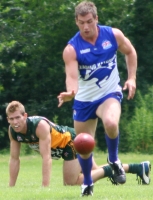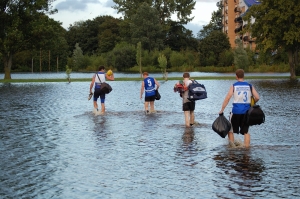The Big Step Up – looking back on the first year at a higher standard
- Sunday, August 12 2007 @ 01:29 am ACST
- Contributed by: Adam Bennett - AFL England President
- Views: 3,131


The Reading Kangaroos are a well-established, fairly well travelled UK footy club. Based 40 miles West of London, England, the club has enjoyed success in the BARFL regional league (2 Grand Final wins), the Nordic Sheep Station Cup (3 wins) and has played in Denmark, Sweden, France and the US. This year, the club made the step up to the London Conference, a 16-a-side competition with a 14 Aussie/2 EU player split. Being outside the capital, it’s tough for regional clubs to field anywhere near that number, but it does enable more British players to play against, and learn from, their more experienced Antipodean cousins.
This report from Reading Roos President Adam Bennett.
The differences in game inside and outside the capital are pretty apparent. Moving from a 12-a-side game, with a 4 Aussie maximum on the pitch, to a game with far less space to use and much more dominated by experienced, technically very capable players, rookies find themselves matched against guys with maybe 20 years of footy experience, and even veterans find themselves matched against players who may have played high level footy back in Oz.
The Roos enjoyed a great start to the season, with three wins from the first 4 matches, actually topping the table at one point. The combination of a decent base of good standard Aussies, with a solid core of British players who have learned their trade playing key positions for both the Roos and the GB Bulldogs, gave the club a really solid start to the season. Regularly playing 8-9 EUs on the park did not seem to slow the guys down at all, and some of these Brits, such as GB players Andy Craig (centre) and Jules Ford (ruck) dominated play in pivotal positions.
Where the Roos came unstuck later in the year though, was against the bigger clubs in London. Certainly not lacking in enthusiasm and commitment, the club suffered from having a player base spread all over south England, which really affected numbers at training, as well as consistency in match-day squad lists. The professionalism of their opposition, the way they move the ball, are more willing to look backwards and across the pitch, really showed how a regional club must improve their game and develop their squad, in order to compete consistently with their better drilled and more organised opposition.
The Roos finished the season in 5th place out of 7 in the London Conference, a creditable performance, particularly considering that virtually none of their opposition ever played more than the requisite 2 EU qualified players. We're really proud of how the boys have stuck at it this year. Even in defeat, they never stopped running and the commitment at the ball was fantastic. Often matched up against much more skilled players, the heart and determination they showed was a credit to the club and the British game.
We've got the off-season now to work on more of the basics with the new recruits, improving technique and tactical awareness around the park, which will improve their confidence and the contribution they can make. Developing the local Brit players has always been a focus at Reading, with access to less Aussies than the London clubs, and it’s an area we can really stand out in.
Four of the Reading Brits have been named in the GB squad to face Ireland and Denmark this Autumn, and a few more have the potential to be there, but suffered through injury toward the end of the season. The Roos are going to use this period and the off-season to replace the regular flow of Aussies going home, and also to develop the new recruits from this year, preparing them for next year’s campaign. Finals footy is the goal!

Centre Andy Craig was in dominant form all year

Never mind the opposition, the Roos had to battle the elements just to get to training!


 RSS news
RSS news Twitter
Twitter Facebook
Facebook